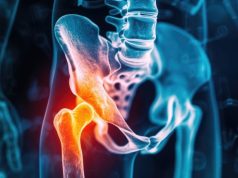Considerable proportion of increased CHF, IHD, and stroke risk mediated by NSAID use
THURSDAY, Aug. 8, 2019 (HealthDay News) — Osteoarthritis (OA) is an independent risk factor for increased cardiovascular disease (CVD), and nonsteroidal anti-inflammatory drugs (NSAIDs) contribute substantially to this risk, according to a study published online Aug. 6 in Arthritis & Rheumatology.
Mohammad Atiquzzaman, from the University of British Columbia in Vancouver, Canada, and colleagues conducted a longitudinal study to examine the role of NSAIDs in the increased risk of CVD among OA patients. A total of 7,743 OA patients and 23,229 non-OA controls matched on age and sex were included. The risk of developing incident CVD was estimated, as well as secondary outcomes of ischemic heart disease (IHD), congestive heart failure (CHF), and stroke.
The researchers found that compared to patients without OA, those with OA had a higher risk of developing CVD, with an adjusted hazard ratio of 1.23 after adjustment for confounding variables. For CHF, IHD, and stroke, the adjusted hazard ratios were 1.42, 1.17, and 1.14, respectively. NSAIDs mediated about 41 percent of the total effect of OA on CVD risk. For the secondary outcomes of CHF, IHD, and stroke, 23, 56, and 64 percent of the effect was mediated via NSAIDs, respectively.
“Our findings suggest that a noteworthy portion of the increased risk of CVD among people with OA is mediated through their NSAIDs use,” the authors write. “Future research is necessary using prospective follow up to confirm these findings.”
Abstract/Full Text (subscription or payment may be required)
Copyright © 2019 HealthDay. All rights reserved.








